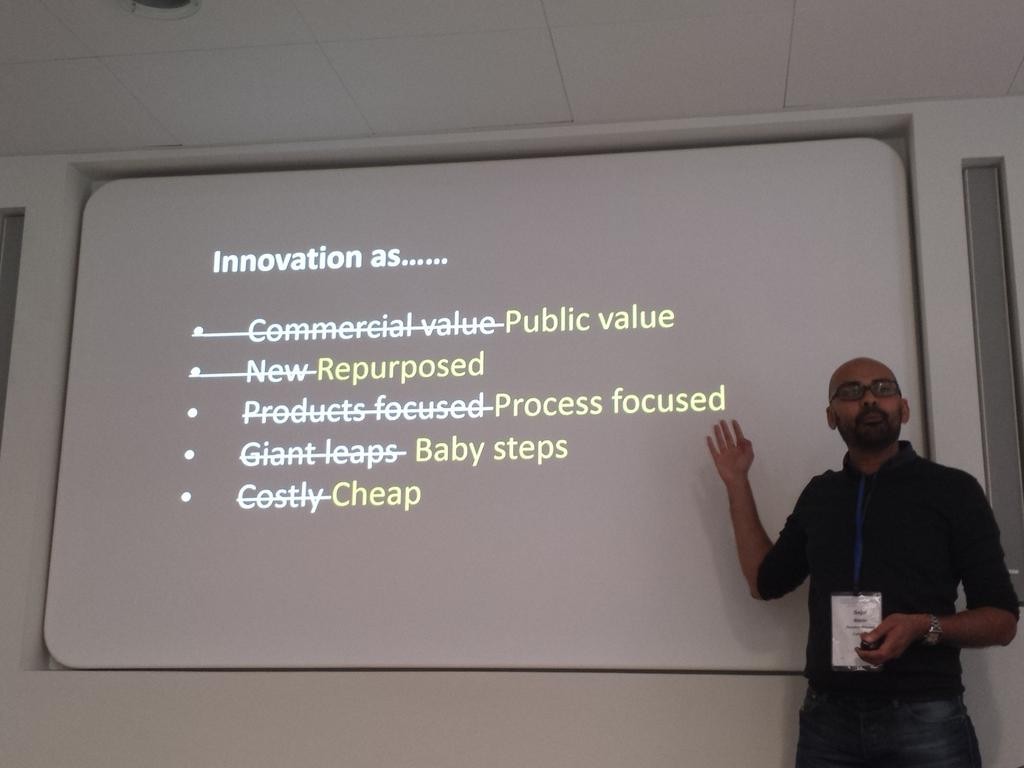For the Museums Computer Group spring event 2015, we invited Nicola Adams, a digital media apprentice at Royal Pavilion & Museums Brighton, to attend as a guest blogger and record the day:
I jumped at the chance to attend the Museum Computer Group’s (MCG) spring event, Innovation: The Emperor’s new clothes on 14 May in Cambridge. Travelling from Brighton meant an early morning wake-up call, but the opportunity to find out more about some the people behind the digital revolution in museums soon cleared my mood.
I am new to the world of museums and am still discovering how everything works in the cultural sector, so this event was an ideal opportunity to find out more and gain inspiration.
Museums have a difficult challenge to engage a demanding audience effectively and keep up with an ever growing and changing digital world. The MCG event brought together representatives from across the country to discuss the way forward in digital innovation.
Peter Pavement, the director of Surface Impression, was the first speaker of the day, delivering a keynote speech about how museums have experimented with media technology throughout their history, and how they have evolved over the years to educate and entertain visitors.
He talked about some of the early forms of innovations, which are still part of the museum experience even today – for example, the use of audio interpretation, with gramophones used as in exhibitions in the early 1900s.
Pavement believes that museums are often scared to step into the unknown, perhaps because staff aren’t from a digital media background or previous projects have failed. But he urged museums to go with the flow and continue to creatively engage. Technology has its up and downs, but even if it fails it could come back in a different way that helps museums in the future.

Sejul Malde redefines innovation
Sejul Malde, a research manager from Culture 24, was our next speaker, looking at innovation from the ground up.
He drew from his experience in the corporate sector and suggested how this can be applied to the cultural sector. For example, using current assets to make new and interesting content that will reach the ever-changing minds of audiences. Malde also talked about changing the rhythms of organisations and the way they produce content.
Scott Renton, a digital developer, and Claire Knowles, the library digital development manager, both from the University of Edinburgh, spoke about a collection digitisation and crowdsourcing/tagging project that uses metadata to make a points-based game. One important element was to work with curatorial staff to harness their knowledge of the collections.
After lunch, Lizzie Edwards, who co-manages the learning programme for the Samsung Digital Discovery Centre at the British Museum in London, led a hands-on talk, with delegates tasked with thinking up learning ideas using technology tipped for futute growth, such as big data.
This task demonstrated that having new and shiny technology isn’t always the way to be innovative, when what is already available might be more cost effective and creative.
From London to Oxford, and Jessica Suess, the partnership officer for Oxford University Museums, explained how an innovation fund is helping to small-scale innovation projects across the service.
Following a quick coffee break, we had some quick-fire lighting talks, which happened to coincide with a heavy rain shower over Cambridge.
My favourite talks included Helen Ward, the Ashmolean Museum’s education officer, discussing how tablet technology has supported groups of students on museum art visits, and Lizzie Edwards, from the British Museum, sharing a new teaching resource, Teaching History with 100 objects.
The day ended with a discussion about what innovation means with two funders – Karen Brookfield, deputy director (strategy) at the Heritage Lottery Fund and Anna Kinnon, the assistant programme manager on the Digital R&D Fund for the Arts, based at Nesta.
With plenty of input from delegates, Brookfield and Kinnon shared what innovation meant to their respective organisations, and urged museums to come forward and pitch new innovative digital ideas.
Overall it was a great day full of inspirational talks in a historic and atmospheric university town, Cambridge. It is exciting to think about the future and how museums will progress with incredible innovating ideas and with help from funders.
